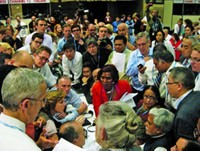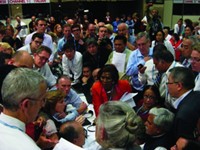Advertisement
Grab your lab coat. Let's get started
Welcome!
Welcome!
Create an account below to get 6 C&EN articles per month, receive newsletters and more - all free.
It seems this is your first time logging in online. Please enter the following information to continue.
As an ACS member you automatically get access to this site. All we need is few more details to create your reading experience.
Not you? Sign in with a different account.
Not you? Sign in with a different account.
ERROR 1
ERROR 1
ERROR 2
ERROR 2
ERROR 2
ERROR 2
ERROR 2
Password and Confirm password must match.
If you have an ACS member number, please enter it here so we can link this account to your membership. (optional)
ERROR 2
ACS values your privacy. By submitting your information, you are gaining access to C&EN and subscribing to our weekly newsletter. We use the information you provide to make your reading experience better, and we will never sell your data to third party members.
Environment
Big Guns Target Global Warming
Climate Change: UN summit, G‑20 meeting focus on invigorating talks on new treaty
by Cheryl Hogue
September 21, 2009
| A version of this story appeared in
Volume 87, Issue 38
World leaders turn their attention to climate change this week in two meetings that could give an important push to talks that are supposed to culminate in a new global climate deal this December.
On Sept. 22, more than 100 world leaders are expected at United Nations headquarters in New York City for the first of the two meetings, the Summit on Climate Change. The second is a meeting of financial officials from the world's largest economies, dubbed the Group of 20 (G-20). It will take place on Sept. 24 and 25 in Pittsburgh.
The two gatherings will provide President Barack Obama with his first opportunities to help shape international policies on human-induced global warming. He will speak at the UN summit and is hosting the G-20 gathering.
At the summit, UN Secretary-General Ban Ki-moon is calling heads of governments together for a day of intensive discussions. Ban says he wants them to "mobilize the political will and generate the momentum needed to reach an ambitious agreement" at the December climate conference in Copenhagen.
The Copenhagen gathering is expected to produce a treaty that will supersede the 1997 Kyoto protocol. That accord called for industrialized countries to slash their greenhouse emissions between 2008 and 2012. Although a number of its allies—including the European Union and Japan—agreed to the pact, the U.S. never ratified it, primarily because the treaty imposed no emission reduction requirements on developing countries.
Talks on a new treaty, however, are bogged down. U.S. Special Envoy for Climate Change Todd Stern acknowledges that the tenor of the climate negotiations "has been difficult so far." Countries remain entrenched in two major blocs, industrialized countries and the developing world, he says.
Developing countries see human-induced climate change as a problem the industrialized world created, Stern says. They fear that curbing their greenhouse gas emissions could stifle their ability to develop and lift millions of people out of poverty, he says.
Industrialized countries, meanwhile, view climate change as a global problem that can't be addressed without action from developing countries, too, especially China and other major emerging economies, Stern says.
Money is another big sticking point in the negotiations. Developing countries are asking each industrialized nation to contribute up to 1% of its gross domestic product to help developing nations fight and adapt to climate change.
Rep. F. James Sensenbrenner Jr. (R-Wis.), the top Republican on the House Select Committee on Energy Independence & Global Warming, calls the developing countries' proposal too expensive and unacceptable.
Michael A. Levi, senior fellow at the think-tank Council on Foreign Relations, points out the developing countries' proposal is a negotiating position, not a final deal. "I'm sure [developing countries] will settle for less," he says. How much less remains to be seen.
The financing question is on the agenda for the G-20, which consists of 19 nations and the European Union that together are responsible for 85% of the world's economy. Brazil, China, India, and Indonesia, which are major developing economies with growing greenhouse gas emissions, are members of the G-20.
This month, the EU offered the first and, thus far, only proposal on climate financial assistance for developing countries. The European Commission, the EU's executive branch, proposed that the EU contribute between 2 billion and 15 billion euros ($2.9 billion to $21.9 billion) per year by 2020. This proposal may be discussed at the G-20 meeting.







Join the conversation
Contact the reporter
Submit a Letter to the Editor for publication
Engage with us on Twitter